French directors Caroline Poggi and Jonathan Vinel, together with star Aomi Muyock, discuss Jessica Forever, a film as inspired by video games as it is by the work of Claire Denis.
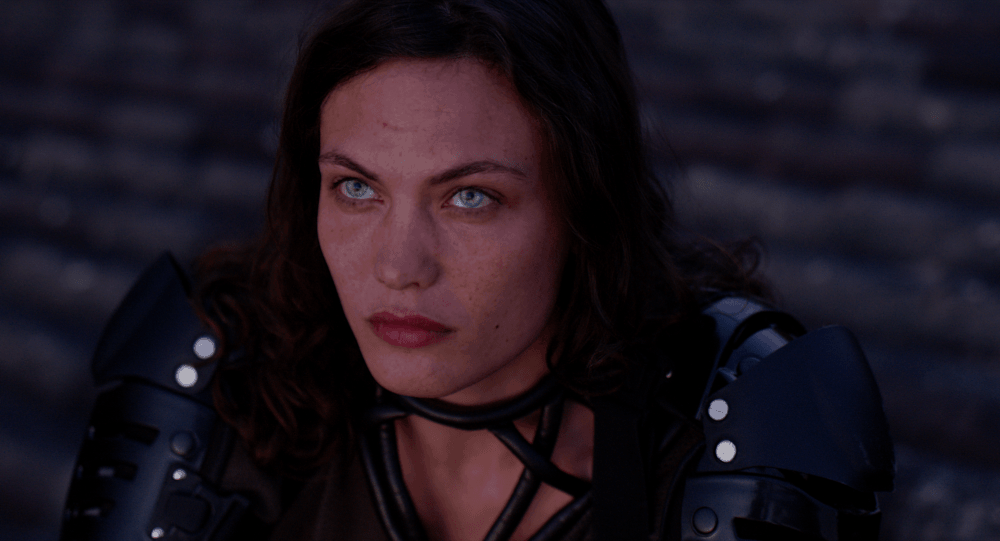
The influence of video games on cinema is a discreet but very real phenomenon. Beside the obvious film adaptations — the latest Tomb Raider movie was clearly inspired by the most recent games in the franchise — this cross-pollination is also visible in the visual style of certain films.
In S. Craig Zahler’s Brawl in Cell Block 99, muscular bad guys stand silently on the sides of the frame, arms slightly apart, their neck stiff and immobile, just like characters in video games. The film’s wide and low angle shots emphasise the harsh geometry of the rooms, and the camera rotates on its axis just like a player changing the view in a game.
French directors Caroline Poggi and Jonathan Vinel told us at TIFF that they haven’t seen Zahler’s film, but their feature debut Jessica Forever adopts a similarly stilted and surreal look that is sure to appear again in future films made by a generation versed in video games.
Like Brawl, the film — which premiered in the Platform section in Toronto — focuses on characters struggling with their natural urge to be violent. Described as ‘orphans’ and ‘monsters’ in the film, they live under the protection of Jessica (Aomi Muyock), a benevolent being who, although she does not have wings, could very well be described as an angel. With her kindness and patience, she strives to cure the young men of their anger, while protecting them from the outside world that wants them dead. Most of the film shows them existing in a beautiful but fragile harmony, and the contrast between their muscular, strong bodies, and the sweetness they find with their mentor, is extremely touching. Just like Jessica, the film itself is unusually soothing.
Directors Caroline Poggi and Jonathan Vinel, together with star Aomi Muyock, talked to us in Toronto about representing violence, creating the film’s odd visual style and dialogue, working with professional and first-time actors, taking inspiration from the video games they play, and Claire Denis’ Beau Travail.
Jessica Forever will premiere exclusively on Shudder in 2019.
Seventh Row (7R): This is a film focused on young men who are angry and who each have a history of violence. Why did you make this choice, and why don’t we see them act violently in the film?
Jonathan Vinel (JV): When we started writing the film, we didn’t tell ourselves that we wanted to make a movie about these violent young men. I think it’s a sort of obsession we have. We are attracted by that topic, and at the same time, it connects to something that is happening in our world right now. People turn to violence because they feel unloved or forsaken, so it’s a reaction to that.
Caroline Poggi (CP): It’s a response to another violence of society. What interested us was to start from these people that we call orphans or monsters in the film — because the film is also set in another world. We wanted to start from this violence that is really in themselves, like an illness, something that’s eating at them. The basis was to say, let’s write a story about people who are potentially not enemies, but monstrous heroes. How do we evolve with this illness inside which ceaselessly tears at us?
[click_to_tweet tweet=”‘People turn to violence because they feel unloved or forsaken. The film is a reaction to that.’ —Jonathan Vinel” quote=”‘People turn to violence because they feel unloved or forsaken. The film is a reaction to that.’ —Jonathan Vinel”]
We wanted characters who were always walking on that tightrope, and who could at any moment fall either in the good, or in the bad. They’re torn apart, and the smallest emotion can make them fall into something that is either extremely soft or extremely violent. This violence is like a madness or an illness — like a tumor inside them that is asleep but is waiting to be woken up.
JV: It was important for us not to show their violence. We were more interested in the consequences of it: how do you keep living when you have been violent? Is it possible to become better, or are you doomed to remain violent for the rest of your life? The violence itself wasn’t really important to us. What was important was whether they could change and become something else. This is what Jessica believes in the film: if you’ve been violent before, you can still change and find redemption.
[click_to_tweet tweet=”‘We wanted characters who were always walking on that tightrope: at any moment, they could fall either in the good, or in the bad.’ —Caroline Poggi” quote=”‘We wanted characters who were always walking on that tightrope: at any moment, they could fall either in the good, or in the bad.’ —Caroline Poggi”]
CP: The violence is like a wound or an injury. So what we’re looking for is what Jessica is looking for, which is to heal that wound.
7R: How did you create Jessica? How did you cast the role and work on Aomi Muyock’s performance? She always seems to be radiant. She illuminates everyone else.
CP: That really was the idea for the character of Jessica: that she is like a guide for the others; a beacon they have to follow despite this darkness that catches up with them. I think, initially, we really wanted to make a gangster film, too, and to put a strong woman at the head of this group, who would be its foundation: a magical character that’s here like a mountain they look at, and who helps them rise up and go higher, surpass themselves and go beyond that violence.
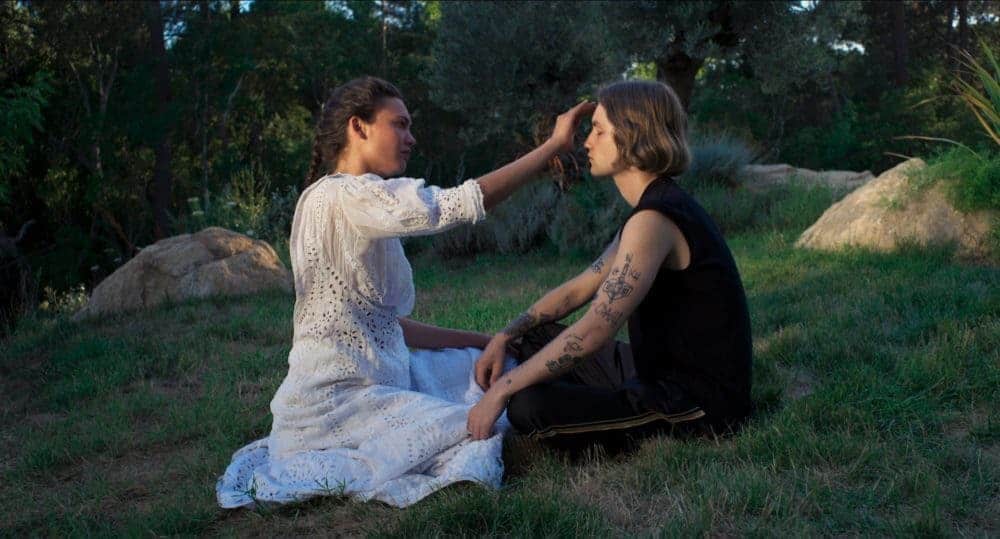
We wanted Jessica to be magical in some way — a being that exists in between the human and the cosmic. So for the casting, we wanted someone in between those two worlds!
JV: We met Aomi quite early, so it’s one of the characters we did the least castings for.
CP: We really wanted someone who could be, for us and for the boys in the film, like a fairy. We had to believe in it as much as the boys did.
[click_to_tweet tweet=”‘Jessica is a guide for the others; a beacon they have to follow despite this darkness that catches up with them.’ —Caroline Poggi” quote=”‘Jessica is a guide for the others; a beacon they have to follow despite this darkness that catches up with them.’ —Caroline Poggi”]
JV: She doesn’t speak that much in the film, but she has to always be present. We have to always be thinking about her, even when we’re looking at the boys. It’s a rather strange thing, to be absent but felt. So every one of her appearances had to be memorable, angelic, but also wounded.
CP: She incarnates redemption, love — the film could have been called ‘Love Forever’. She incarnates all these dreams they have, and she tries to help them reach them through love. We say that she has a power, but her only power is to love them deeply.
Aomi was in the very first castings. When we saw Gaspar Noé’s Love, I wrote down “the girl from Love.” I think she has a great presence.
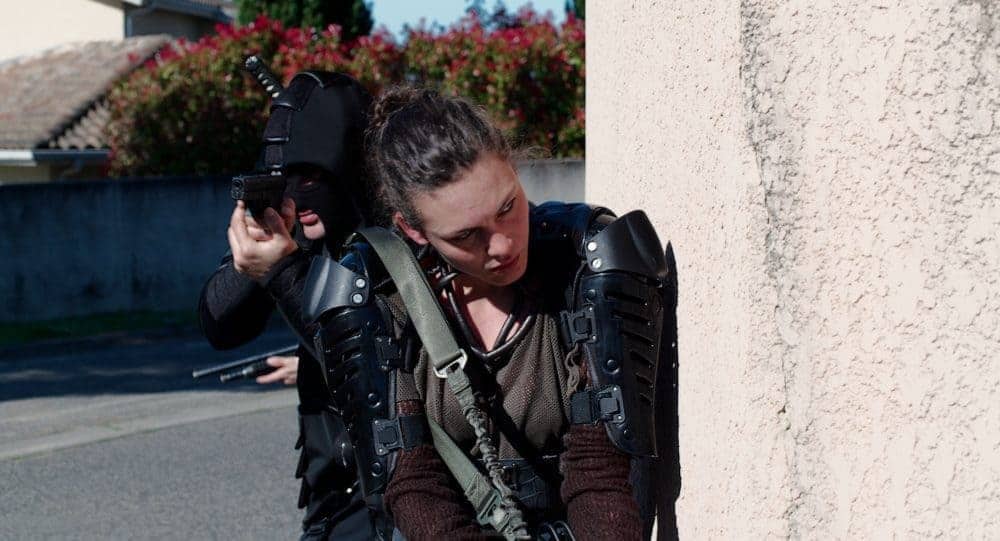
7R: Talking about the language of the film, there is a sense that many elements are inspired by American things. The dialogue almost sounds like it was translated from English. It’s a bit stilted and strange. We almost feel like we’re watching a film in a different language.
CP: We wrote the film in French because that’s our language, but for the dialogue, we really wanted to give this sense that the boys didn’t grow up in the real world. They didn’t grow up in society. We wanted to have them speak differently than they would in the real world.
We wanted them to speak a little like knights or warriors. And with very strong emotions expressed very genuinely, without any afterthought. Something very pure.
JV: They don’t imply anything. When they say “I love you”, that’s what they mean. They don’t circle around things. That’s why we rehearsed a lot with the actors who speak in the film. We wanted to find this kind of music, something very simple and direct.
CP: There are also many actors in the film who were first-time actors. Kevin (Eddy Suiveng) at the beginning of the film, for example, had acted a little before, but his way of talking is naturally very realistic and quick.
[click_to_tweet tweet=”‘We wanted the boys to speak like knights or warriors. With very strong emotions expressed genuinely, without any afterthought. Something very pure.’ —Caroline Poggi” quote=”‘We wanted the boys to speak like knights or warriors. With very strong emotions expressed genuinely, without any afterthought. Something very pure.’ —Caroline Poggi”]
It’s very beautiful what you can reach if you remove all that, when you try to make them say things that are like poems. What it does to their bodies when they try to live those words… What we’re trying to do is to displace those characters, to make them reach another world — like an elevation. We want to turn them into sacred figures. As much as we want Jessica to be a goddess, we want the boys to be demigods.
7R: How was it to deliver this dialogue and to play with the other actors in that strange register?
Aomi Muyock (AM): We did a lot of rehearsals and it was very particular, because the directors wanted us to speak in a very slow manner, with a tone that remained rather flat, but with a lot of emotion.
It helps you get out of what you normally are. It puts you in a different state, where you feel like everything is slowed down and very intense.
[click_to_tweet tweet=”‘As much as we want Jessica to be a goddess, we want the boys to be demigods’ —Caroline Poggi” quote=”‘As much as we want Jessica to be a goddess, we want the boys to be demigods’ —Caroline Poggi”]
JV: As if you were in The Matrix.
AM: Yes! And with the other actors, we were all in the same state, so we all moved together. There was a subtle harmony between all of us.
It was maybe a little more difficult with some actors, because they wanted to play like they were on stage, and we wanted something more spontaneous.
7R: Some of the actors playing the boys are recognisable — Paul Hamy, for example, seen in The Ornithologist. What was your process for the casting? And how did you work to make all the actors and first-time actors play in a similar way?
CP: The casting for the boys lasted about 6 months. It was very long. It was the first time we did castings, because all our previous films were with people we sort of already knew. We had an idea in mind of what kind of boys we wanted. We met many of them.
JV: But we already had that idea of mixing experienced actors with first-time actors, because we knew that some characters had to deliver rather technical things that would require an experienced actor. For example, Raiden used to have a monologue in the film that was cut, but he’s still a rather demanding character. So we knew we would need an experienced actor for that role, and we’d already worked with Paul Hamy.
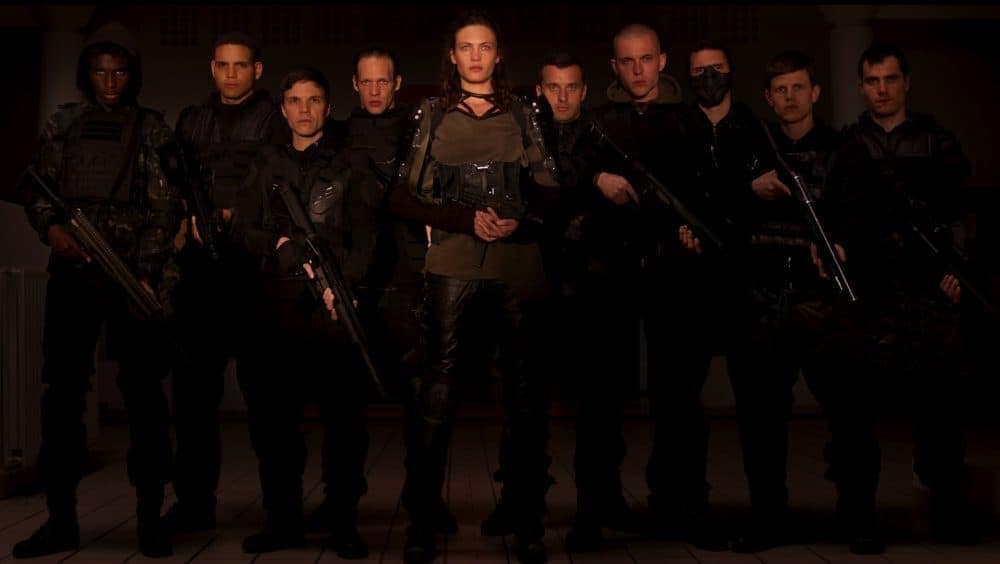
CP: I wasn’t really interested in working only with experienced actors. And I think many of the boys we cast lead lives that are on some level, and to varying degrees, quite similar to the lives of the orphans in the film. And it’s amazing to see this collision: obviously, Lukas Ionesco [who plays Julien] is an experienced actor, and he doesn’t lead the same life as Eddy Suiveng [who plays Kevin], who wasn’t. But they become friends in the film.
AM: Everyone came from very different milieus. At the same time, we really were all together. It was a really good mix, very well balanced. We were working during the day, and the rest of the time, we were all staying together. We could have gone our separate ways, but we didn’t. We were always, all of us, together.
CP: I can’t film someone I don’t like. There’s needs to be a desire there. It’s very important for me.
[click_to_tweet tweet=”‘We were working during the day, and the rest of the time, we were all staying together. We could have gone our separate ways, but we didn’t. We were always, all of us together.’ —Aomi Muyock” quote=”‘We were working during the day, and the rest of the time, we were all staying together. We could have gone our separate ways, but we didn’t. We were always, all of us together.’ —Aomi Muyock”]
7R: The film seems informed by the style of video games, especially the sections where the character you play isn’t doing anything and just walks around the landscape. The shots are slow but very constructed. There’s a surreal effect.
JV: We play a lot of video games. When we were creating the character of Jessica, we were playing Metal Gear Solid 5. There’s this character in the game who’s called Quiet; she’s a sniper who has an illness where, if she talks, she can infect other people. So she never talks, and it’s very tragic; there’s a love story that can’t be said because she can’t talk to the man she loves, as it could kill him. There are many strong women like her in this game. We were also inspired by this other game called The Witcher.
For the film’s aesthetic, we wanted the image to look very digital. We pushed the sharpness of the cameras to the extreme. That creates a hyper real image, with so much detail that it becomes strange, and this aesthetic resembles that of video games.
[click_to_tweet tweet=”‘We play a lot of video games. When we were creating the character of Jessica, we were playing Metal Gear Solid 5.’ —Jonathan Vinel” quote=”‘We play a lot of video games. When we were creating the character of Jessica, we were playing Metal Gear Solid 5.’ —Jonathan Vinel”]
CP: Some of our friends told us, when we released the first image of Jessica, that they thought it was a virtual, CGI image. I didn’t even realise that, because I’m so used to looking at it.
JV: There’s this tendency in cinema where, when people shoot with a digital camera, they want to recover this celluloid look. So they break the digital aspect by adding a little grain, etc. We did the opposite, we made the sharpest image possible.
I think it’s also about the way we shot, which relates to the video game aesthetic. It’s about the way we treat the locations. They feel like very normal locations that exist in the real world, but at the same time, they feel like they’re outside of the city; it’s like we’re in the decor, the background.
CP: The background city noise is missing, a bit like in the video games when you get lost in the world of the game. You [Jonathan] love walking around the various places in the game. You leave the mission and just explore the space. ‘Open world’ games let you do that. You can go as far as you want and explore.
[click_to_tweet tweet=”‘People often break the digital look by adding grain, etc. We did the opposite: we made the sharpest image possible.’ —Jonathan Vinel” quote=”‘People often break the digital look by adding grain, etc. We did the opposite: we made the sharpest image possible.’ —Jonathan Vinel”]
For the dialogue, sometimes you’re in a very beautiful setting in the game, like a sunset, and the character will say something, and it’s like you’re in a movie. There’s this liberty that you can have in the game that maybe you can’t have elsewhere.
JV: Video games really let you wander. That’s also what we were interested in for the film. It’s not really an action film; there are a few shootouts, but what interested us more was what happens in the moments in between the action, and how the group is affected by the death of one of their own. It really all takes place in waiting. In video games, the shootouts aren’t really what’s important; it’s more about what you do the rest of the time.
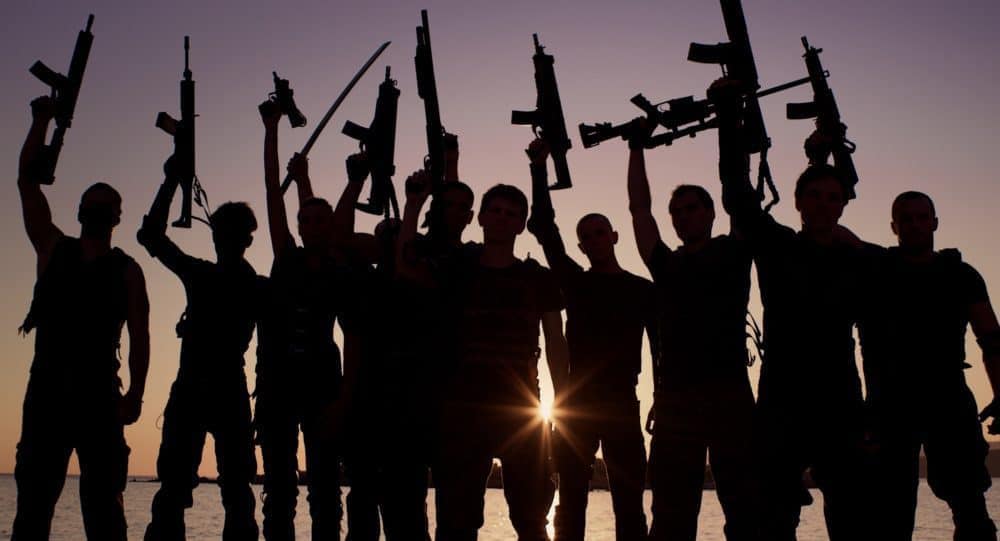
7R: This reminds me of Claire Denis’ Beau Travail, which follows soldiers on a military basis who do no fighting, but only wait. We see these very muscular men do things like ironing, sleeping, exercising. Jessica Forever seems very much inspired by that film.
CP: Beau Travail has always been an inspiration, of course! What I find really beautiful is when the frontiers of masculinity are displaced. You reach something very feminine, with very masculine bodies. This is what Denis achieves: you’re watching soldiers, and it feels like you’re watching contemporary dance. There’s an immense tenderness, and I think it’s amazing how she manages to push back the frontiers of masculinity.
When you go to parts of France in the South — for example, in Corsica, where I’m from — you can see how the men touch each other. The young men are super masculine, but they’re close; they grab each other, they hug, they kiss each other’s necks. This sensuality is really beautiful.
[click_to_tweet tweet=”‘BEAU TRAVAIL has always been an inspiration. Denis displaces the frontiers of masculinity, and reaches something very feminine, with very masculine bodies.’ —Caroline Poggi” quote=”‘BEAU TRAVAIL has always been an inspiration. Denis displaces the frontiers of masculinity, and reaches something very feminine, with very masculine bodies.’ —Caroline Poggi”]
It follows the same principle when we have these very muscular, violent boys in Jessica Forever, who talk to each other with very pure, simple words — almost like they’re children. There’s something there that really touches me.
JV: When the contrast is really pushed, you think “it’s not possible that they could be so sweet!” It’s funny because it’s cute!
Read all our TIFF coverage here >>
Chloé Zhao’s The Rider similarly focuses on the boundaries of conventional masculinity, following a young cowboy hurt — and almost killed — by the violent and macho sport that he loves: rodeo. Torn between his nurturing impulses towards his younger sister, and his desire to get back on the saddle, the young man is forced to reconsider his priorities, and the reasons behind all of his actions.

